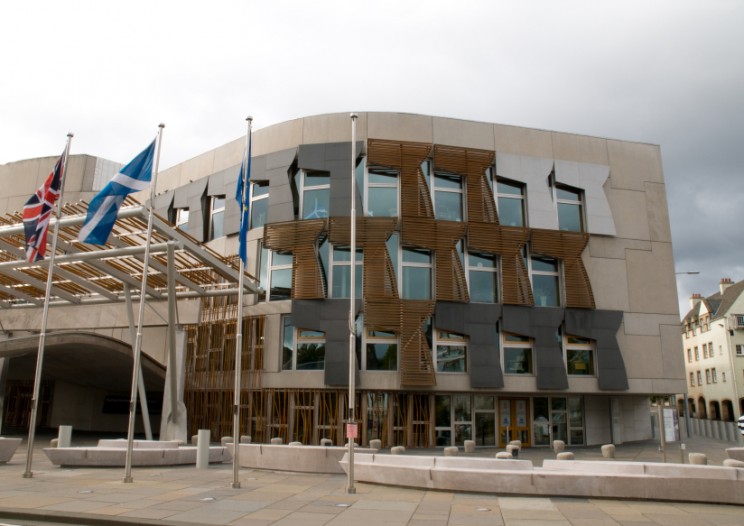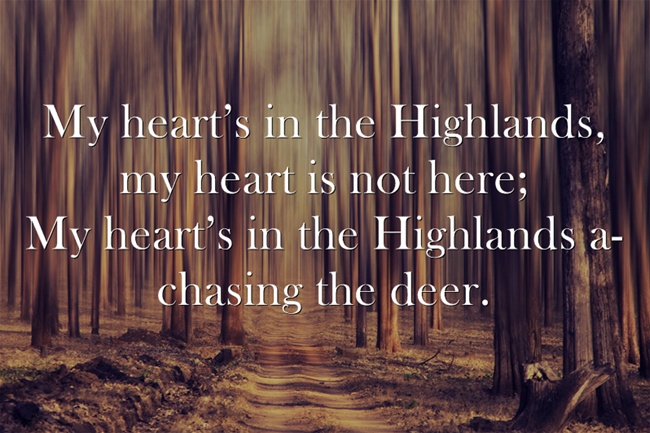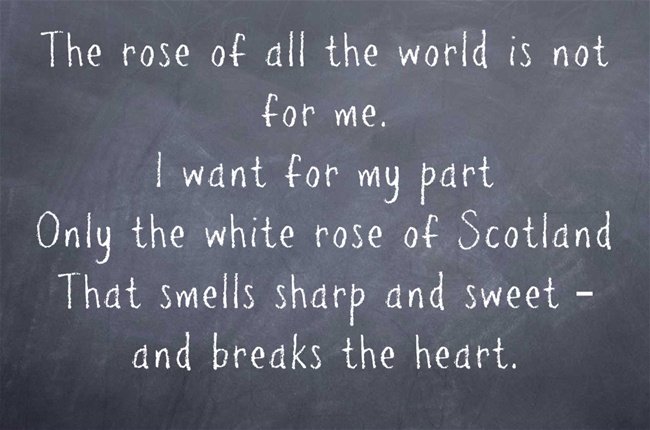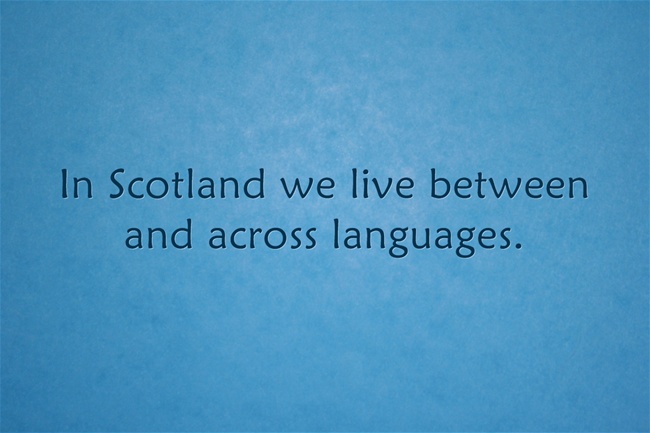THE DATE: 18 September 2014, Fateful Day of Scotland’s Independence Referendum
THE PLACE: A Sceptred Isle
DRAMATIS PERSONAE:
Alexander the Great, First Minister of Scotland
Daveheart, Prime Minister of the Britons
Assorted Other Ministers, Attendant Lords, Lordlings, Politicos, and Camp Followers
Three Witches
A Botnet of Midges
The Internet (A Sprite)
A Helicopter
Dame Scotia
St George of Osborne
Boris de Balliol, Mayor of Londres
UKIP (An Acronym)
Chorus
ACT I: A Blasted Heath.
Enter THREE WITCHES
When shall we three meet again,
In thunder, lightning, or in rain?
When the referendum’s done,
When the battle’s lost and won.
That will be when Salmond’s gone.
Where the place?
Hampstead Heath.
Better Together unto death!
Is that your phone?
Daveheart calls: anon! –
Fair is foul, and foul is fair:
Hover through the plebs and filthy air.
[WITCHES vanish.]
ACT II: The Scottish Camp (Voters at Dawn)
Enter a SMALL FOLKS’ CHORUS, Botnet Midges,
Who flap their wings, and then commence this chant:
See here assembled in the Scottish Camp
The Thane of Yes, Lord Naw-Naw, Doctor Spin.
Old folk forget; yet all shall be forgot,
But we’ll remember, with advantages,
This Referendum Day. Then shall that name
And date, familiar as our household words –
Alex the Great, the eighteenth of September –
And many, many here who cast their votes,
A true sorority, a band of brothers,
Long be remembered — long as “Auld Lang Syne” –
For she or he who votes along with me
Shall be my sibling; be they curt or harsh
This day shall gentle their condition:
Scots students down in England now a-bed
Shall think themselves accursed, they were not here,
Casting their votes in this our referendum.
ACT III: On Arthur’s Seat, a Mount Olympus
Near the Scots’ Parliament at Holyrood
Proud Edward Milibrand, Daveheart, Nicholas Clegg,
And Anthony a Blair perch on the crags
With English Exiles. Now Lord Devomax speaks:
Stands England where it did? Alas, poor country,
Almost afraid to know itself, a stateless
Nation, post-imperial, undevolved;
Still sadly lacking its own Parliament,
It commandeers to deal with its affairs
The British Parliament, whose time it wastes
With talk of what pertains to England only,
And so abuses that quaint institution
As if it were its own, not for these islands
Set in a silver sea from Sark to Shetland.
[Exit, pursued by A. Blair]
ACT IV: The Archipelago (High Noon)
Enter THE INTERNET, A Sprite, who sings:
Full fathom five Westminster lies;
Democracy begins to fade;
Stout, undevolved, John Bull still eyes
Imperial power so long mislaid;
England must suffer a sea-change
Into something small and strange,
MPs hourly clang Big Ben:
DING-DONG!
Come, John Bull, and toll Big Ben.
ACT V: South London: top floor of the Shard
Boris de Balliol, St George of Osborne,
Attendant Lords, and Chorus Bankerorum,
Et Nympharum Tamesis et Parliamentorum
Sheet lightnings flash offstage while clashing cymbals
Crescendo in a thunderous night’s farrage.
ST GEORGE: Blow, winds, and crack your cheeks! Rage! Blow!
Ye exit polls and hurricanoes spout!
Come, Boris, here’s the place. Stand still.
How fearful
And dizzy ’tis, to cast one’s eyes so low!
The crows and choughs, that wing the midway air
Seem gross as bankers’ apps: here from this Shard
See floors of smug short-sellers, dreadful traders
Inside a giant gherkin, and the City
Fraternity of inegalite
Spread out around us while its denizens
Appear like lice.
ATTENDANT LORDS: Scotia and Boris, hail!
BORIS: O Bella, Bella Caledonia,
Hic Boris Maior, Londinii Imperator,
Ego –
Fanfare of hautboys, bagpipes, and a tucket.
ST GEORGE: A tucket!
BORIS: Tempus fugit.
CHORUS: Fuckaduckit!
Pipers, desist! Your music from this height
Has calmed the storm, and, blithely, while we wait
For the result to come from Holyrood,
So charms the ear that, clad in English tartans –
The Hunting Cholmondesley, the Royal Agincourt,
And chic crisscrosses of the National Trust –
Our city here, ravished by this fair sound
Of tweeted pibroch, YouTubed from the Shard
To Wapping, Westminster, and Heathrow’s tarmac,
While gazing up from bingo and Big Macs,
Brooding upon our disunited kingdom,
Stands all agog to hear Dame Scotia speak.
Scotia descends, ex machina helecopteris
HELICOPTER: Bzzzzzzzzzzzzzzzzzzzzzzzzzzzzz.
SCOTIA: O England, England, your tight cabinet’s
Sly Oxbridge public-schoolboy millionaires
Fight while your country sinks beneath their yoke;
It weeps, it bleeds; and each new day a gash
Is added to those wounds: new Europhiles
Repulsed, the world repelled; England whose riots
Failed to stop students’ fees for your own folk
Or to contain their escalating cost.
Sad, catastrophic, calculating drones
Miscalculating loans, kicking the arts,
England betrayed by Scoto-Anglish Blair
Into wrong wars and then to Gordon Brown,
Jowled lord of loss and light-touch regulation.
O England, England! Rise and be a nation
United under your own Parliament!
Methinks I am a prophet now inspired
And thus, inspiring, do foretell of you:
Your Europhobia must not endure,
For violent fires must soon burn out themselves;
Small showers last long, but sudden storms are short.
Learn from the Scots: plant windfarms, make yourself
A Saudi Arabia of tidal power,
Though not of gender; learn, too, from the French,
There is no need to stay a sceptred isle,
Scuffed other Eden, demi-paradise;
No fortress, built by UKIP for themselves,
Against infection in their Brussels wars;
Be happy as a nation on an island
That’s not England’s alone, a little world,
This precious stone set in a silver sea,
Which serves to link it now with all the globe,
Or as the front door to a happy home,
Be, still, the envy of less happier lands,
And set up soon an English Parliament,
Maybe in London, Britain’s other eye,
Maybe in Yorkshire, so you may become
A better friend to Scotland whose folk love
This blessed plot, this earth, and independence.
She zooms northwards.
Heading image: Macbeth by John Martin (1789–1854). Scottish National Gallery. Public domain via Wikimedia Commons.
The post Scots wha play: an English Shakespikedian Scottish independence referendum mashup appeared first on OUPblog.

I want an independent Scotland that is true to the ideals of egalitarianism articulated in some of the best poetry of Robert Burns. I want a pluralist, cosmopolitan Scotland accountable to its own parliament and allied to the European Union. My vote goes to Borgen, not to Braveheart. I want change.
Britain belongs to a past that is sometimes magnificent, but is a relic of empire. Scotland played its sometimes bloody part in that, but now should get out, and have the courage of its own distinctive convictions. It is ready to face up to being a small nation, and to get over its nostalgia for being part of some supposed ‘world power’. No better, no worse than many other nations, it is regaining its self-respect.
Yet the grip of the past is strong. Almost absurdly emblematic of the complicated state of 2014 Scottish politics is Bannockburn: seven hundred years ago Bannockburn, near Stirling in central Scotland, was the site of the greatest medieval Scottish victory against an English army. Today Bannockburn is part of a local government zone controlled by a Labour-Conservative political alliance eager to defeat any aspirations for Scottish independence. In the summer of 2014 Bannockburn was the site of a civilian celebration of that 1314 Scottish victory, and of a large-scale contemporary British military rally. The way the Labour and Conservative parties in Scotland are allied, sometimes uneasily, in the ‘Better Together’ or ‘No’ campaign to preserve the British Union makes Scotland a very different political arena from England where Labour is the opposition party fighting a Conservative Westminster government. England has no parliament of its own. As a result, the so-called ‘British’ Parliament, awash with its Lords, with its cabinet of privately educated millionaires, and with all its braying of privilege, spends much of its time on matters that relate to England, not Britain. This is a manifest abuse of power. The Scottish Parliament at Holyrood looks – and is – very different.
Like many contemporary Scottish writers and artists, I am nourished by traditions, yet I like the idea of change and dislike the status quo, especially the political status quo. National identity is dynamic, not fixed. Democracy is about vigorous debate, about rocking the boat. Operating in an atmosphere of productive uncertainty is often good for artistic work. Writers enjoy rocking the boat, and can see that as a way of achieving a more egalitarian society. That’s why most writers and artists who have spoken out are on the ‘Yes’ side. If there is a Yes vote in the Scottish independence referendum on 18 September 2014, it will be a clear vote for change. If there is a ‘No’ vote, it will be because of a strong innate conservatism in Scottish society – a sense of wanting to play it safe and not rock the boat. Whether Scotland’s Labour voters remain conservative in their allegiances and vote ‘No’, or can be swayed to vote ‘Yes’ because they see the possibility of a more egalitarian future — is a key question.
As we get nearer and nearer to the date of the Scottish independence referendum on 18 September, I expect there will be an audible closing of ranks on the part of the British establishment. Already in July we have had interventions from the First Sea Lord (who gave a Better Togetherish speech at the naming ceremony for an aircraft carrier), and a lot of money from major landowners and bankers has been swelling the coffers of those opposed to independence. In Glasgow it was good to read at an event with Liz Lochhead, Kathleen Jamie, Alasdair Gray, and other poets and novelists in support of independence. This is a very exciting time for Scotland, a time when relationships with all kinds of institutions are coming under intense scrutiny. Whatever happens, the country is likely to emerge stronger, and with an intensified sense of itself as a democratic place.
The post Why Scotland should get the government it votes for appeared first on OUPblog.

30 November is St Andrew’s Day, but who was St Andrew? The apostle and patron saint of Scotland, Andrew was a fisherman from Capernaum in Galilee. He is rather a mysterious figure, and you can read more about him in the Oxford Dictionary of National Biography. St Andrew’s Day is well-established and widely celebrated by Scots around the world. To mark the occasion, we have selected quotations from some of Scotland’s most treasured wordsmiths, using the bestselling Oxford Dictionary of Quotations and the Little Oxford Dictionary of Quotations.
There are few more impressive sights in the world than a Scotsman on the make.
J. M. Barrie 1860-1937 Scottish writer
From the lone shielding of the misty island
Mountains divide us, and the waste of seas –
Yet still the blood is strong, the heart is Highland,
And we in dreams behold the Hebrides!
John Galt 1779-1839 Scottish writer
O Caledonia! Stern and wild,
Meet nurse for a poetic child!
Sir Walter Scott 1771-1832 Scottish novelist
O flower of Scotland, when will we see your like again,
that fought and died for your wee bit hill and glen
and stood against him, proud Edward’s army,
and sent him homeward tae think again.
Roy Williamson 1936-90 Scottish folksinger and musician
I love a lassie, a bonnie, bonnie lassie,
She’s as pure as the lily in the dell.
She’s as sweet as the heather, the bonnie bloomin’ heather –
Mary, ma Scotch Bluebell.
Harry Lauder 1870-1950 Scottish music-hall entertainer
My poems should be Clyde-built, crude and sure,
With images of those dole-deployed
To honour the indomitable Reds,
Clydesiders of slant steel and angled cranes;
A poetry of nuts and bolts, born, bred,
Embattled by the Clyde, tight and impure.
Douglas Dunn 1942– Scottish poet
Who owns this landscape?
The millionaire who bought it or
the poacher staggering downhill in the early morning
with a deer on his back?
Norman McCaig 1910–96 Scottish poet
The Little Oxford Dictionary of Quotations fifth edition was published in October this year and is edited by Susan Ratcliffe. The Oxford Dictionary of Quotations seventh edition was published in 2009 to celebrate its 70th year. The ODQ is edited by Elizabeth Knowles.
The Oxford DNB online has made the above-linked lives free to access for a limited time. The ODNB is freely available via public libraries across the UK. Libraries offer ‘remote access’ allowing members to log-on to the complete dictionary, for free, from home (or any other computer) twenty-four hours a day. In addition to 58,000 life stories, the ODNB offers a free, twice monthly biography podcast with over 130 life stories now available. You can also sign up for Life of the Day, a topical biography delivered to your inbox, or follow @ODNB on Twitter for people in the news.
Subscribe to the OUPblog via email or RSS.
Subscribe to only language, lexicography, word, etymology, and dictionary articles on the OUPblog via email or RSS.
View more about the Little Oxford Dictionary of Quotations on the 

View more about the Oxford Dictionary of Quotations on the 









